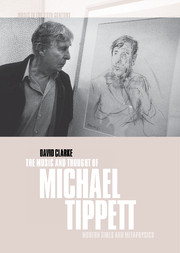Book contents
- Frontmatter
- Contents
- Acknowledgements
- References to Tippett's scores and essays
- 1 Tippett and the ‘world vision’ of modernity
- 2 The significance of the concept ‘image’ in Tippett's musical thought: a perspective from Jung
- 3 Back to Nietzsche? Transformations of the Dionysiac in The Midsummer Marriage and King Priam
- 4 Metaphysics in a cold climate: The Vision of Saint Augustine
- 5 ‘Shall we …? Affirm!’ The ironic and the sublime in The Mask of Time
- 6 The meaning of ‘lateness’: mediations of work, self and society in Tippett's Triple Concerto
- 7 The golden bird and the porcelain bowl: Byzantium and the politics of artefacts
- Notes
- Bibliography
- Index
1 - Tippett and the ‘world vision’ of modernity
Published online by Cambridge University Press: 13 October 2009
- Frontmatter
- Contents
- Acknowledgements
- References to Tippett's scores and essays
- 1 Tippett and the ‘world vision’ of modernity
- 2 The significance of the concept ‘image’ in Tippett's musical thought: a perspective from Jung
- 3 Back to Nietzsche? Transformations of the Dionysiac in The Midsummer Marriage and King Priam
- 4 Metaphysics in a cold climate: The Vision of Saint Augustine
- 5 ‘Shall we …? Affirm!’ The ironic and the sublime in The Mask of Time
- 6 The meaning of ‘lateness’: mediations of work, self and society in Tippett's Triple Concerto
- 7 The golden bird and the porcelain bowl: Byzantium and the politics of artefacts
- Notes
- Bibliography
- Index
Summary
The concept of ‘world vision’ and the concept of modernity
On the plane of personal psychology, there are no people more different than the poet, who creates particular beings and things, and the philosopher, who thinks and expresses himself by means of general concepts … [Yet] we must accept the existence of a reality which goes beyond them as individuals and finds its expression in their work. It is this which I intend to call the world vision.
At a crucial point in his career Michael Tippett (1905–98) would probably have read these lines. The book from which they come, Lucien Goldmann's The Hidden God, is appropriately discussed in the Tippett literature as being influential on the tragic conception of the composer's second opera King Priam (1958–62). But Goldmann's text affords other possibilities too. For one thing it offers me a way round the invidious problem of beginning this book, which – because it deals with a complex of issues where none takes priority over the others – has no natural starting point. In the spirit of the present volume I want to use Goldmann as an interpretative catalyst or intermediary through which to read out certain of Tippett's own values.
Tippett's growth to artistic maturity is rightly correlated with the technical development of his musical language. Yet his claim to the status of composer of stature depends on something beyond this: something which conforms to that characteristic Goldmann terms ‘world vision’.
- Type
- Chapter
- Information
- The Music and Thought of Michael TippettModern Times and Metaphysics, pp. 1 - 12Publisher: Cambridge University PressPrint publication year: 2001



